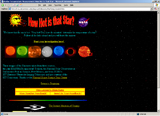Measuring Stellar Temperatures: How Hot Is That Star?
How hot is the Sun? How do scientists know? Students do guided web research through many sites on Solar astronomy to answer this question, and others: how to measure the temperature of any star, and how astronomers use H-R diagrams to classify stars by temperature and luminosity.
Key Questions
1, What is the Sun like?
2. What is Temperature?
3. How can you measure the Sun's temperature?
4. What makes stars like the Sun hot and how is this measured?
5. What temperature scales do people use?
6. What does temperature mean in the Hertzprung-Russell diagram?
Learning Objectives
1. Students will know the basic information about the sun and its structure and physics by researching related sites on the WWW.
2. Students will know how stellar temperatures are determined from their emitted radiation and about different temperature scales.
3. Students will know what an HR Diagram is, how to make one, and how to use it relating spectral type (temperature) and luminosity.
Detailed Learning Objectives
General Subject Areas
Astonomy, Space Science, Physics
|
 Author: Jim Meunier, Jim Lehman
Author: Jim Meunier, Jim Lehman
VIEW THE LESSON
Student Activities
This lesson is divided into six investigations that can be done and evaluated separately. Each section has a combination of sites to engage students, and content questions which they are to answer by visiting the linked solar science sites. Most sections have a self-scored online quiz, and the last section has a Java applet for students to arrange stars of various temperatures in correct order on a Hertzsprung- Russell diagram of Luminosity vs. Temperature.
Student Prerequisites
Browser skills, general knowledge of the Sun and stars, knowledge of mathematical symbols.
Assessment
Each unit features an online “Sun Quiz” and students can print their results and submit to the teacher.
Extended Learning
N/A
|
View Teacher Feedback
Send Us Your Feedback
Time Requirements
Approximately 1-2 hours for teacher preparation, and 1-2 hours each for any of the 6 lesson units.
Materials Required
-Notebook
-Computer with an Internet connection and a web browser
-Ability to print html pages as text is helpful
Required Plugins
-Java
Additional Resources
Teacher Lesson Page
Best For Grades
middle school
National Science Education Standards (NSES)
grades 5-8
grades 9-12
State Science Standards
Grade 8 Physical Science
Grades 9-12 Earth Sciences
Have a science question? Visit our Ask an Expert page. Email questions or comments about SEGway resources to: outreach@ssl.berkeley.edu
|












